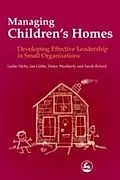Autorentext
Leslie Hicks is Senior Lecturer in the School of Health and Social Care at the University of Lincoln. She specialises in the fields of services for children and adults, child protection and wellbeing, and social exclusion. Ian Gibbs is a Research Consultant at the Social Work Research and Development Unit at the University of York. His main area of research is looked after children, particularly those in residential care and foster care. Helen Weatherly is a Research Fellow at Centre for Health Economics, University of York. The focus of her research is on the economic evaluation of health and social care interventions. Sarah Byford is a Senior Lecturer at the Institute of Psychiatry, King's College London, and specialises in the economic evaluation of mental health and social care services.
Zusammenfassung
Managing Children's Homes focuses on leadership, effective management, the allocation of resources, and ensuring positive outcomes for young people in residential care.
The book develops an interdisciplinary understanding of what needs to be taken into account when establishing and maintaining good practice on behalf of young people living in children's homes. The authors explain the considerable variation in quality achieved by children's homes and how this relates to management style, working environment and staff structures. The skills and qualities that make effective managers of homes are explored. These, along with factors such as the provision of resources, are investigated to demonstrate how to attain a successful children's home environment and longer-term achievement for looked-after children.
Based on innovative, DfES-funded, interdisciplinary research, this book will be essential reading for staff and managers in children's care homes and will also be of interest to students, policy-makers and directors of social services.
Inhalt
Dedication. Acknowledgements. 1. Introduction and Background. 2. Who Lives and Works in Children's Homes? 3. Creating, Maintaining and Influencing a Staff Team. 4. Shaping and Maintaining the Role of Manager within the Context of the Wider Organisation. 5. Shaping Work with Young People. 6. What Does Leadership Look Like in Children's Homes? 7. What Resources Are Used, How Much Do These Cost, and How Are Costs Linked to Outcomes? 8. What Makes a Difference to Outcomes for Young People? 9. Conclusions and Implications. Appendix A: Research Methodology. Appendix B: Sample Models. References. Subject index. Author index.
